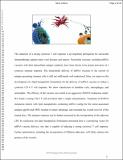Lipid Nanoparticle Assisted mRNA Delivery for Potent Cancer Immunotherapy
Author(s)
Oberli, Matthias; Reichmuth, Andreas Michael; Dorkin, Joseph Robert; Mitchell, Michael J; Jaklenec, Ana; Anderson, Daniel Griffith; Langer, Robert S; Fenton, Owen Shea; Blankschtein, Daniel; ... Show more Show less
DownloadLanger_Lipid nanoparticle.pdf (1.208Mb)
PUBLISHER_POLICY
Publisher Policy
Article is made available in accordance with the publisher's policy and may be subject to US copyright law. Please refer to the publisher's site for terms of use.
Terms of use
Metadata
Show full item recordAbstract
The induction of a strong cytotoxic T cell response is an important prerequisite for successful immunotherapy against many viral diseases and tumors. Nucleotide vaccines, including mRNA vaccines with their intracellular antigen synthesis, have been shown to be potent activators of a cytotoxic immune response. The intracellular delivery of mRNA vaccines to the cytosol of antigen presenting immune cells is still not sufficiently well understood. Here, we report on the development of a lipid nanoparticle formulation for the delivery of mRNA vaccines to induce a cytotoxic CD 8 T cell response. We show transfection of dendritic cells, macrophages, and neutrophils. The efficacy of the vaccine was tested in an aggressive B16F10 melanoma model. We found a strong CD 8 T cell activation after a single immunization. Treatment of B16F10 melanoma tumors with lipid nanoparticles containing mRNA coding for the tumor-associated antigens gp100 and TRP2 resulted in tumor shrinkage and extended the overall survival of the treated mice. The immune response can be further increased by the incorporation of the adjuvant LPS. In conclusion, the lipid nanoparticle formulation presented here is a promising vector for mRNA vaccine delivery, one that is capable of inducing a strong cytotoxic T cell response. Further optimization, including the incorporation of different adjuvants, will likely enhance the potency of the vaccine. Keywords: cancer immunotherapy; cytotoxic T cells; immune response; lipid nanoparticles; mRNA; vaccines
Date issued
2017-03Department
Massachusetts Institute of Technology. Institute for Medical Engineering & Science; Harvard University--MIT Division of Health Sciences and Technology; Massachusetts Institute of Technology. Department of Chemical Engineering; Massachusetts Institute of Technology. Department of Chemistry; Koch Institute for Integrative Cancer Research at MITJournal
Nano Letters
Publisher
American Chemical Society (ACS)
Citation
Oberli, Matthias A. et al. “Lipid Nanoparticle Assisted mRNA Delivery for Potent Cancer Immunotherapy.” Nano Letters 17, 3 (December 2016): 1326–1335 © 2017 American Chemical Society
Version: Author's final manuscript
ISSN
1530-6984
1530-6992